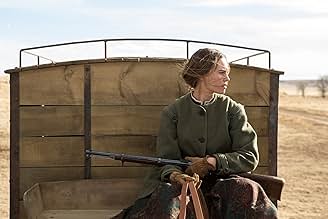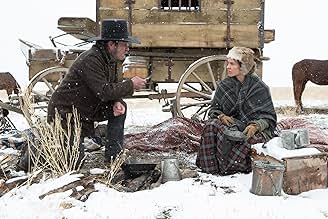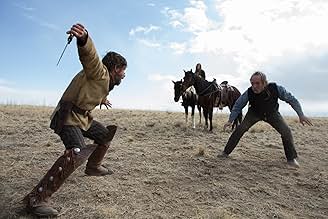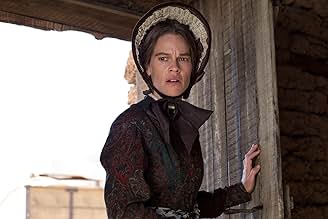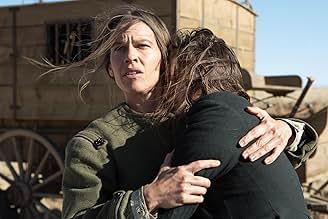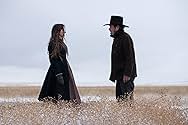The Homesman
- 2014
- Tous publics
- 2h 2min
Trois femmes ayant perdu la raison à cause de la dure vie de pionnières sont emmenées à travers le pays en diligence aménagée en fourgon sous la responsabilité de la pieuse et indépendante M... Tout lireTrois femmes ayant perdu la raison à cause de la dure vie de pionnières sont emmenées à travers le pays en diligence aménagée en fourgon sous la responsabilité de la pieuse et indépendante Mary Bee Cuddy, qui recrute George Briggs, un vagabond, pour l'aider.Trois femmes ayant perdu la raison à cause de la dure vie de pionnières sont emmenées à travers le pays en diligence aménagée en fourgon sous la responsabilité de la pieuse et indépendante Mary Bee Cuddy, qui recrute George Briggs, un vagabond, pour l'aider.
- Réalisation
- Scénario
- Casting principal
- Récompenses
- 5 victoires et 14 nominations au total
Avis à la une
A homesman is someone tasked to bring people back to their homes. In this film, the people that needed safe transport are three mentally- disturbed women. Mary Bee McCuddy, a plain but hardy spinster, volunteered to be their homesman. Along the way, she rescues a old man Thomas Briggs from being hung by vigilantes and conscripts him to help her with her mission in exchange for saving his life. Together, they gather the three ladies and escort them from Nebraska homes across the dangerous Midwest prairie to a safe haven in Iowa.
Hilary Swank is an actress who had already won a couple of Oscars for playing strong women who had taken on masculine roles in life -- Brandon Teena in "Boys Don't Cry" and Maggie Fitzgerald in "Million Dollar Baby". As Mary Bee McCuddy, a pioneer lady who bravely accepts a task only men are expected to do, Swank again goes on the same award-baiting path. The movie worked so well when Swank was on screen. She was absolutely compelling in this offbeat role as if this was written with her in mind. The movie was not the same when her character was not there.
Tommy Lee Jones is one actor who, as of late, had seemingly been confined to playing curmudgeonly and cantankerous old men, and his Briggs here is not any different. This film is only Jones' second directorial effort since his critically-acclaimed debut in "Three Burials of Melquiades Estrada" back in 2005. As director, he was very generous to his lead female star Swank, and always gave way to let her shine. As actor, he does consistently as he is expected but this role of a grumpy old outlaw seems too familiar for him already. He wisely played Briggs with some self-deprecating humor to break the tendency of the story to become monotonously bleak.
There were some remarkable cameos from other award-winning or nominated stars in much smaller roles. John Lithgow is his usual capable self playing the Reverend Dowd who reluctantly sends McCuddy off on her task. Hailee Steinfeld plays 16-year old Tabitha Hutchinson to whom Briggs offers a surprising proposal. James Spader, in his usual over-the-top style, plays condescending hotel owner Aloysius Duffy. And last, but definitely not the least, none other than THE Meryl Streep plays perfectly kind and hospitable Altha Carter, who runs the institution in Iowa the women are headed for. These actors appear on screen for only ten minutes or so, but they leave a lasting impression.
The narrative may have been slow and desolate . However, the unusual situations, disturbing imagery, startling story developments and committed performances by the cast all keep our attention riveted. The cinematography with the muted colors worked well with the windswept landscape of its setting, as much a character in itself. The costumes and production design rang true to its mid-19th century time period. The haunting and unsettling musical score create an atmosphere of bitter emptiness. The insufferably miserable topic is clearly not for everyone. But for those who decide to give it a chance, the rewards will be satisfying. 7/10.
The Homesman is an emotionally and powerful, idea-rich, almost humorless story -- with an immense amount of humor. It has very tight, economic tale telling with no fat on the bone; in which much is implied, historical accuracy hits its target by nuance, and the story itself is deeply respectful of an intelligent audience.
The Homesman is not "entertainment" in the haha, shoot-'em-up Western sense. It's realism committed to a moral cause -- criticism of the disenfranchised, the homeless, the people who cannot make it no matter how hard they try. It has a brilliant sense of time and place that tells the life stories of dozens of hard-enduring, long-suffering "forgotten men" -- the women no less than the men.
The key heartbreaker is Hilary Swank's character of Miss Mary Bee Cuddy. She's born into a Western frontier world where she and everyone else believes and practices that "No man, having put his hand to the plough, and looking back, is fit for the kingdom of God." Hard workers and decent people. But tragically that is not enough. Why? The Homesman leaves that question deliciously unanswered. Life is not fair. God is not just.
Beautifully The Homesman does -- kind of -- answer life's problems with the value of sheer vitality and gutsiness itself. Thus that key visual motif in the movie that comes from: George Caleb Bingham, "The Jolly Flatboatmen". We must dance the dance of life, however mad.
There have been hundreds of relatively good westerns produced in the past half century where the hero and heroine remain strong and stoic whilst riding through the barren lands their suits and dresses remain pressed and in pristine condition while their hair is coiffed perfectly, and miraculously the heroine's makeup never dries, cracks or runs. Well such is not the case in the Homesman.
Hilary Swank has never been afraid to shed the glamor of Hollywood and for her role as the stubborn, single, and capable farmer Mary Bee Cuddy the potential suitors that she asks to marry her turn her down and explain that she is far too plain looking, sexless, and too controlling in nature. So Mary Bee Cuddy agrees to make the arduous journey across the western plains maybe in the hope of finding a suitor in Idaho as she has run out of potential suitors in Nebraska and seems to be losing hope in raising a family on her own farm in Nebraska.
As Mary Bee Cuddy commences her journey she comes across someone even more homely and desperate than herself in the name of aging drifter George Briggs who is within minutes of losing his life at the end of a rope for illegally claiming mining rights to another persons staked property. The terms set forth by Mary Bee Cuddy before she will agree to free George Briggs from his futile situation and imminent death by hanging are simple. He must first agree to travel across the western plains of Nebraska to assist Mary Bee Cuddy in the transportation of three insane women to a church in Idaho where they will receive the care and attention they will require to survive.
And so the two hardened caretakers and their three insane passengers set out on their journey which I found to be not like any other western I had previously seen. This is not a humorous and light hearted western but a tough, grueling, and sad journey with what I was surprised provided unexpected results. Some people may not be happy with the last 30 minutes of this feature film, but this is actually where writer/actor/director Tommy Lee Jones hooked me with what I felt was a good feature film that ended strongly.
There are numerous cameos throughout the film including standout performances by Tim Blake Nelson as a lonesome cowboy, John Lithgow as Reverend Dowd, and Jesse Plemons as a derelict husband to one of the insane women. Look for mother Meryl Streep in Idaho as the Reverends wife Altha Carter who enjoys sharing the screen with her real life daughter Grace Gummer who plays one of the three insane women Arabella Sours.
I give the film a good 7 out of 10 rating.
Prarie madness sets in and three women are slated to be returned Back East. The problem is that one of the three "responsible" men is unwilling to step up, so a woman volunteers. She is strong and courageous, more than most men, but isolated and desperate for a husband because she is "bossy, and plain as an old tin can."
Her ultimate fate is incongruous, completely at odds with her character. A willful suspension of disbelief is required at this point.
Solid performances by Swank, Jones, Lithgow, and the actress who played the madwomen make it entertaining, if a bit long.
Le saviez-vous
- AnecdotesGlendon Swarthout's novel was published in 1988. Paul Newman owned the rights, and wanted to direct the film himself. After several failed scripts, he gave up.
- GaffesDuring the Indian attack, every shot of the carriage has mountains in the background. The road from Nebraska to Iowa is nowhere near any mountains.
- Citations
George Briggs: Are you an angel?
Mary Bee Cuddy: You're not dead.
George Briggs: Help me. Will you help me? For God's sake.
- ConnexionsFeatured in Film '72: Épisode datant du 19 novembre 2014 (2014)
- Bandes originalesRosalie The Prairie Flower
Music & Lyrics by George Frederick Root (as George Fredrick Root)
Performed by Hilary Swank
Meilleurs choix
- How long is The Homesman?Alimenté par Alexa
- In what year is this film set?
Détails
- Date de sortie
- Pays d’origine
- Site officiel
- Langues
- Aussi connu sous le nom de
- Deuda de honor
- Lieux de tournage
- Sociétés de production
- Voir plus de crédits d'entreprise sur IMDbPro
Box-office
- Budget
- 16 000 000 $US (estimé)
- Montant brut aux États-Unis et au Canada
- 2 429 989 $US
- Week-end de sortie aux États-Unis et au Canada
- 45 433 $US
- 16 nov. 2014
- Montant brut mondial
- 3 819 421 $US
- Durée2 heures 2 minutes
- Couleur
- Mixage
- Rapport de forme
- 2.39 : 1
Contribuer à cette page








